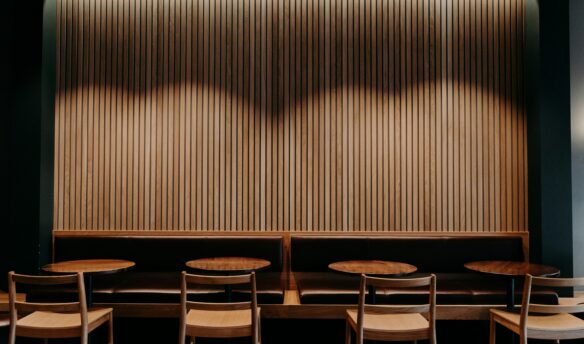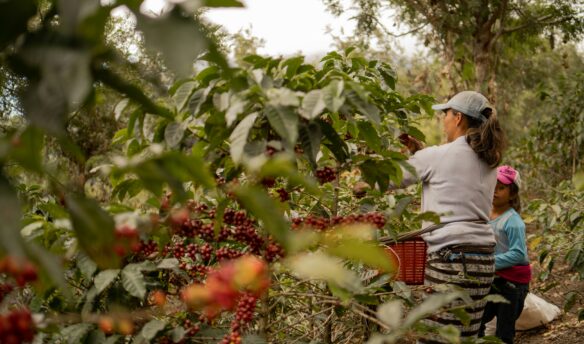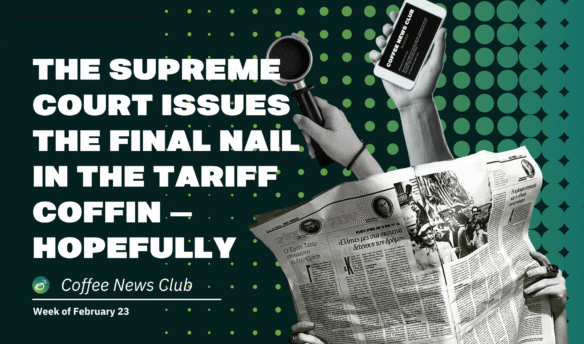Where am I going to get my free coffee now? Plus, coffee value goes up in Ethiopia, Nestlé releases another new coffee variety, and move over Dalmatians—there are 101 challenged ballots at the Compass Coffee union election.
‘Ethiopia Eyes Value Addition to Harness Coffee Potential Amid Growing Demand From China’ – via Xinhua
Ethiopia is Africa’s largest coffee producer, and 25 million residents rely on the industry for their livelihoods. While coffee accounts for more than a third of the country’s export revenue, some are looking to increase revenue by adding value through roasting and packaging before export.
The way the coffee supply stream is designed makes it so that coffee picks up value as it moves from farm to importer to roaster to consumer—roasted coffee generally fetches a higher price than green. One way for a country that produces coffee to retain more revenue is to take on more processes that add value.
“Africa has the best coffees, but they are not marketed as they should be,” said Amir Hamza, chairperson of the African Fine Coffees Association. “After the green beans are exported from Africa, they will be blended and roasted by companies outside the continent.”
Xinhua reports that China’s growing demand for coffee offers Ethiopia an opportunity to generate more revenue that will stay in the country. Companies like Hadero, an Ethiopia-based coffee brand, are investing in value-addition processes to keep more of the money generated by coffee in the country.
Hadero operates its own processing plant that sorts, roasts, grinds, and packages coffee for export. One of their key markets is China, which has been importing more coffee from Ethiopia over the past few years.
“Ethiopia has been exporting green coffee beans for many years,” said Mubarek Ahmed, Hadero’s director of business development. “We have to add value to it, as the price for value-added coffee is much higher than for green coffee. This will contribute more to the Ethiopian economy.”
‘Pret a Manger Customers Left Fuming Over End of ‘Free Drinks” – via the Guardian
Pret a Manger is ending its popular UK subscription program that promised “free drinks” to members for a remarkably low monthly cost—and customers aren’t happy.
In the fall of 2020, the UK-based cafe chain launched the YourPret Barista subscription, which offered subscribers up to five drinks a day for £20 (about $25) per month. It was designed to encourage customers to return to the chain’s city-based locations, which were hard hit due to pandemic lockdowns and a lack of office workers.
In 2023, Pret rebranded the subscription, changing the name and upping the cost to £30. The brand blamed inflation and the need to raise wages for the price hike.
Now, it’s gone, to be replaced by a lower-cost program that offers discounts instead of free drinks.
“[The subscription] was an innovative way to reconnect with our loyal customers and introduce Pret to tens of thousands of new ones, bringing customers back into our shops with an offer that almost seemed ‘too good to be true,'” Pret managing director Clare Clough wrote in a letter announcing the change. “Four years and over a quarter of a billion coffees later, we have decided that it’s time to rethink how it works.”
If you were taking full advantage of the deal and getting five drinks a day (and if you were, good work! That’s so much coffee!), the new subscription would cost you an extra £3,000 per year for the same number of drinks. Needless to say, customers aren’t happy with the change—some threatened to cancel their subscriptions, and one called it a “terrible, terrible decision.” In the traditional internet overreaction, some called for a boycott of Pret.
Coffee loyalty programs come in various shapes and sizes, from buy-ten-get-one-free punch cards to discount apps with exclusive perks. Such generous versions like Pret’s are rare: Panera offers an all-you-can-drink “unlimited sip club” membership, while the British chain LEON has its own subscription service that costs £5 less than Pret’s. However, it’s worth noting that both brands have amended their subscription services: either they raised the price or changed how the program works.
Perhaps there really is no such thing as a free drink.
More News
‘Chapter 11 Bankruptcy Filings Increase for US Coffeehouses’ – via STiR Coffee & Tea
‘Botrista Reaches $120 Million in Funding with New Round Led by Jollibee’ – via Daily Coffee News
‘McDonald’s Canada Taps Price-Conscious Consumers With C$1 Coffee‘ – via World Coffee Portal
‘Coffee Fortune Telling Goes 21st Century‘ – via Sprudge
‘El Salvador’s President Offers Free Coffee to Promote Local Businesses‘ – via Tico Times
‘Good to Go Cups is Up and Running with Reusable Cup Solution’ – via Daily Coffee News
‘Stumptown & Laika Team Up For A Coraline Cold Brew‘ – via Sprudge
The Week in Coffee Unionizing
Workers at Compass Coffee in Washington, DC, held their union election last week, but most of the ballots were challenged. All 22 of the unchallenged ballots voted in favor of unionizing, but the other 101 were challenged by organizers or Compass representatives, adding to what has become a contentious union drive.
A National Labor Relations Board regional director will review the disputed ballots and decide the next steps. Part of the reason for the high number of disputed ballots is that Compass hired 124 new employees just weeks before the vote, including the owner’s family members and several DC-area CEOs. The union said those new hires led to a 190% increase in the Compass workforce and claimed the company was trying to dilute the union vote, a charge Compass management denied.
According to the Washington Post, Compass CEO Michael Haft was frustrated by the number of ballots that union representatives challenged, saying that they challenged “every single person who voted that wasn’t part of the organizing committee.” Organizers disputed this. “If [Haft’s] fleet of new hires are eligible according to NLRB guidelines, he has nothing to worry about,” said union organizer Joseph Babin.
Resolving issues with the challenged ballots could take weeks, but union reps were still pleased with the results. “We were not expecting, in full honesty, a unanimous yes across the board, especially since a lot of these unchallenged ballots were new hires,” Babin said. “The fact that we were able to connect with them so well that we got them all to vote yes, to me, is incredibly encouraging.”
The Week in Corporate Coffeewashing
Climate change has hindered coffee production, from untimely frosts in Brazil to extended droughts across growing regions to more pests and diseases on coffee farms to shifting weather patterns.
At the same time, demand for coffee isn’t slowing down. Figuring out how to meet this demand in a world beset by climate change is a challenge that Nestlé is looking to solve by developing proprietary, higher-yielding coffee varieties.
In 2021, the Swiss multinational released the first two of its “new generation of low carbon coffee varieties,” Roubi 1 and 2, robusta varieties grown in Mexico. Now, it is launching Star 4, “a novel high-yielding Arabica coffee variety,” which “also possesses the characteristic taste of Brazilian coffee,” according to a press release.
According to Marcelo Burity, the company’s head of green coffee development, “Optimizing cultivation practices remains vital as they are the primary factor contributing to the environmental impact of a cup of coffee.”
Coffee farming is often talked about as a key producer of carbon emissions. While farms can emit harmful gasses, the reality is more complicated. How the coffee was grown—smallholder agroforestry versus large-scale mono-crop—what fertilizer was used, were pesticides used, and was waste composted can all impact how much a farm emits. In some cases, coffee farms can act as carbon sinks, locking in more than they emit.
All of this is important context, and the claim that farming is the sole culprit of carbon emissions is often pushed by companies with something to gain—to sell you pod machines or “beanless” coffee alternatives. And of course, Nestlé is a giant corporation with an enormous carbon footprint: the company emitted 118.68 million tons of CO2 equivalent in 2021, more than the entire country of Kenya or Belgium.
Beyond the Headlines
‘Five Things That Caught Our Eye at World of Coffee Copenhagen’ by Chloé Skye Weiser






